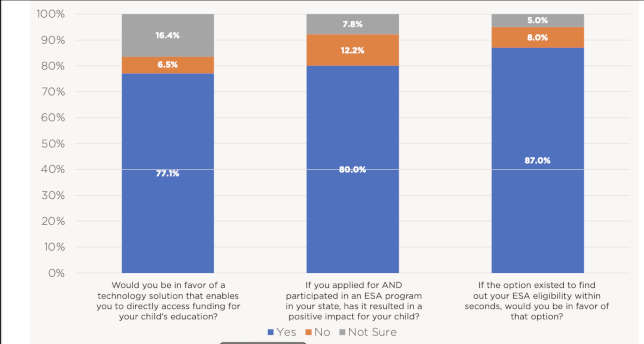In partnership with the EdSAFE AI Alliance, El Segundo (California) Unified School District (ESUSD) has announced it will establish an AI Policy Lab to promote the safe and ethical use of AI in its K–12 schools.

2023 has shown the largest growth in percentage of high schools offering foundational CS since 2018: while 57.5% of U.S. public high schools offer it, compared to 53% last year, access disparities still exist.

A recent nationwide poll by state-based education funding company Odyssey showed that a majority (73%) of parents want access to publicly funded, state-based K–12 education programs. These include Education Savings Accounts (ESAs), microgrants, and other funding.
New York City-based InnovateEDU has announced the revival of the EdSAFE AI Alliance to promote the responsible use of AI in education on a global scale. The organization is a coalition of education/learning and technology partners dedicated to fostering AI policy, collaboration, and best practices in K–12 education.
Ed tech nonprofit Michigan Virtual is adding an AI Lab to its Michigan Virtual Learning Research Institute to explore the practical and ethical applications of generative AI in K–12 educational settings, according to a news release.
The Software & Information Industry Association today released a set of guiding principles for artificial intelligence in education technology.
A report released today by the National Center for Education Statistics revealed that the vast majority of public schools in the United States are still facing challenges hiring teachers and staff, though fewer report feeling "understaffed."
Educational research organization Aurora Institute is calling for the federal government to "let go of the notion that education has to be a linear, time-bound sequence of learning that occurs only within formal education institutions."
Education innovation organization Aurora Institute has released a new publication, “Going Beyond the Traditional: Next Gen Credentials and Flexible Learning Pathways.” The publication outlines the difference between what traditional high school diplomas and next generation credentials demonstrate about a student’s learning, competency, and achievement and makes recommendations for adopting new ways of tracking them.
A key insight for AI-based learning is that it enables adaptivity, with technology's "ability to meet students where they are, build on their strengths, and grow their knowledge and skills." But the caveat is that adaptivity can sometimes be too specific and limited, and important parts of learning can be left out or insufficiently developed. An important goal is to work "toward AI models that fit the fullness of the visions for learning — and avoid limiting learning to what AI can currently model well."